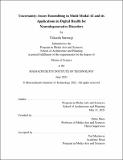| dc.description.abstract | Common neurodegenerative disorders such as Alzheimer's dementia and Parkinson's disease are increasingly recognised as leading causes of death and disability with debilitating symptoms such as progressive cognitive decline, communication breakdown, motor dysfunction and accompanying psychiatric disorders. However, factors such as unavailability of efficient and cost-effective assessments for conclusive diagnosis, time-consuming test protocols, poor prognostic capabilities, and inadequate treatment options with accompanying side effects are all barriers to progress in providing faster and more effective intervention to individuals living with these life-altering disorders. In this thesis, we take a step towards using digital health and machine learning to improve diagnostic and prognostic capabilities and to address remote care via telemedicine in Alzheimer's dementia and Parkinson's disease. Our goal is to provide more cost-effective, non-invasive, and scalable technologies for risk stratification of Alzheimer's dementia using speech. We also aim to monitor drug response and disease progression for Parkinson's disease via telemedicine, allowing real time symptom tracking through wearables alongside a patient's treatment status, which will help facilitate remote care and dynamic and adaptive treatment plans. In addition to addressing the challenges in diagnosis and treatment of neurodegenerative disorders, we further propose a novel uncertainty aware boosting technique for multi-modal ensembling and evaluate it on healthcare tasks related to Alzheimer's dementia and Parkinson's disease. This presents manifold benefits, such as reducing the overall entropy of the system, making it more robust to heteroscedasticity, and improving calibration of each of the modalities along with high quality prediction intervals. | |
